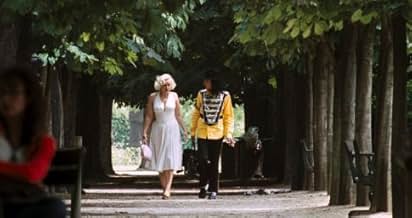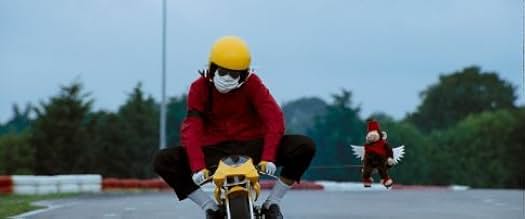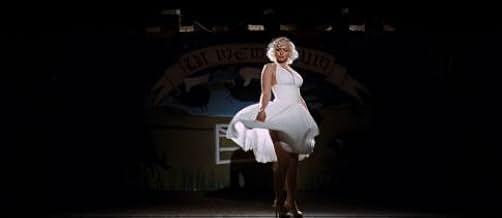In Paris trifft ein junger Amerikaner, die als Michael Jackson-Doppelgänger arbeitet, Marilyn Monroe, die ihn in ihre schottische Gemeinde einlädt, wo sie mit Charlie Chaplin und ihrer Tocht... Alles lesenIn Paris trifft ein junger Amerikaner, die als Michael Jackson-Doppelgänger arbeitet, Marilyn Monroe, die ihn in ihre schottische Gemeinde einlädt, wo sie mit Charlie Chaplin und ihrer Tochter Shirley Temple lebt.In Paris trifft ein junger Amerikaner, die als Michael Jackson-Doppelgänger arbeitet, Marilyn Monroe, die ihn in ihre schottische Gemeinde einlädt, wo sie mit Charlie Chaplin und ihrer Tochter Shirley Temple lebt.
- Regie
- Drehbuch
- Hauptbesetzung
- Auszeichnungen
- 2 Nominierungen insgesamt
- Buckwheat
- (as Michael Joel-Stuart)
Empfohlene Bewertungen
Mister Lonely is a much more colourful film than anything associated with Korine. Its visuals (such as set design, camera angles and cinematography) are very pleasing, accentuated by its seemingly unrelated parallel narratives and absurdist premise. A Michael Jackson impersonator in France meets a Marilyn Monroe impersonator, who introduces him to a Scottish commune full of various impersonators. While superficially the film appears to be frivolous, clearly it has deeper social comments to make about identity, loneliness and alienation, issues the director has been reportedly grappling with personally.
The other narrative relates to a group of missionaries in Panama, with Werner Herzog portraying a priest, Father Umbrillo, delivering food aid by plane, assisted by various nuns. While the connection between the dual narratives is unclear, this story is strangely surreal, visually alluring and entertaining.
There is a small flat spot towards the end of the film, but for most of the film's 112 minutes, I had a big smile that was hard to wipe off my face. Charlie Chaplin, Shirley Temple, James Dean, Little Red Riding Hood, Queen Elizabeth, the Pope, The Three Stooges, Abraham Lincoln, Madonna and Buckwheat are all there.
The humour and irony are used with a clever and skillful blend of under- and over-statement. There is an underlying subtle sadness to some of the characters who, in spite of their eccentric alter egos, remain ordinary people that an audience can relate to. The film is intelligent and emotionally honest. One part is particularly close to the bone for me and brought tears to my eyes. This is Korine's most accessible and enjoyable film. It is full of originality and I highly recommend it.
I can't say that I was necessarily disappointed with MISTER LONELY, but there are definitely as many aspects about it that I did not like as those that I enjoyed immensely. When I did my best to corral a few friends into the screening, everyone inevitably asked what the critics had said--strangely enough--and all the reviews seemed to say the same thing about the film: "a beautiful and meandering mess." Not only did that sound exactly like the kind of film I wanted to see, but it pretty much nails the film to the letter.
Unquestionably, the film is stunning in visual beauty.
Harmony has a preternatural knack for the visual form; he is in essence a photographer who thinks himself a bit better of a storyteller than he is. His stories are surely fascinating, but certainly being a raconteur of sorts is his least strong talent. His concepts are always fantastic, but his execution can become irritating and frankly gimcrack. Even in his interviews, when he goes on a tirade about talking to Orthodox Jews who are dentists and play basketball, calling him a sinner, you chuckle and can almost see the image in your head of such a scene... then you grow bored and wish he would just answer the damn question about where he got his idea for such-and-such a film, etc.
As most other reviewers on IMDb and in the press have stated, you could see this film for strictly the "nun footage" alone. Those specific ethereal scenes certainly are a true breath of fresh air, and of course Harmony also has a terrific ear for the discovery and use of the best music to go along with his dreamy "surreal realism" style.
The two largest problems for me with this one: 1) The dialogue was at time so sappy and sentimental that it made me wonder how such a contrarian critic such as Mr. K could come up with or employ such hackneyed and cloying material (especially an "epilogue" sequence of sorts involving talking eggs that is probably one of the worst scenes in all of American film history), 2) The acting could have been punched up a bit, especially with Diego Luna who had the physical style of Jackson down pat, but just couldn't pull off the voice, the "hee-hee," or an acting performance that transcended a frightened, timid child of 13 (and, yes, I did catch that this was somewhat the "point," but the whole film's ensemble seemed a bit too pedomorphic this time round... rather like the characters, dialogue, and even narrative of Bret Easton Ellis' last novel in which you almost want to grab the guy and say, "Hey, you're better than this. You're not a kid anymore. And your characters aren't kids anymore. Time to move on and evolve.")
The Chaplin character was also such a wooden villain, so despicable in every way, that I believed his development suffered the same kind of flatness one would see in a late 90's romantic-comedy.
It will be difficult for me to recommend MISTER LONELY to even my most staunch artistic cineaste friends; but, I'm personally glad I saw it, and--again--there was imagery that I will never see anywhere else.
Looking forward to his next piece.
The first admission is that the film is the precursor to Trash and Spring but the vision is not refined yet. Contrary to various misconceptions, Korine is not a nihilist, about nothing, though he flirts with provocation. This has all manner of that, in its main thrust however it is about beauty and meaning as much as any Malick.
The provocation is as in his other works about the ways we consume culture, as biting as Godard in his time and at least here as superficial. The image always reflects your view of the thing pictured, so when you perceive superficial things to rail against it's going to be a superficial perception. Here an example is the segment in the retirement home with senile old people gawking at Michael Jackson, one of them tapping his head with a hammer.
Now about the thing that matters here.
The film is centered on people acting roles - in Trash they were pretending to be old people, in Spring it's even more subtle and deep. Here impersonators of cultural icons; Jackson, Marilyn, Chaplin. Among them, Abe Lincoln, Queen Elizabeth and the Pope so he can have opportunity to provoke later on; a Pope who stinks and so on.
So this is about people who are not content to be who they are, who have to adopt an image that lets them go out and do things, opening up a horizon of life as performance with the complexities of self more evident than just people on the street.
Part of the fun is to see the famous faces in all sorts of hijinks, the faces picked because they're so recognizable; Jackson, Marilyn, Chaplin, each one's demons as famous as their glamorous light. But more, it's an opportunity to conjure our preconceptions ahead of us, show the complexity of that image we know: where we expected the neurotic self, we find people doing things, happily drinking in a pond or playing pingpong, where we expected glamorous light, we find the same troubled souls as the rest of us, feeling small or neglected.
It falters for me in that Korine decided to have this play out in a separate stage, a castle in Scotland, removed from life. It is his way of hitting up against the problem: an inner life of dreams as the desire to be someone else, as an escape to a stage that has no life to gracefully perform for no one (seen as a performance they stage for an audience of three people), so in the end when Jackson sheds the artificial self and returns to the world an ordinary guy, we see that it's this world and your own self that has to be lived. (Korine must have realized that if it is to pose a real question, the stage of dreams has to be seen around us, accessible; ordinary middle America in Trash, the this-worldly illusion of Florida.)
So a mild failure from this view, but with hindsight a necessary one to move beyond it. The gamble is to not be stuck grooming a view.
There's a great image here where we see the man cultivate the intuitive reach. In a separate subplot Herzog packs nuns in a plane to fly over the tropics and drop parcels of food, a nun finds herself airborne; the ecstatic rush of sky, the apprehension of god as the swirl of the whole horizon, everywhere light and air.
Wusstest du schon
- WissenswertesIn an interview with a newspaper in his hometown of Nashville, Tenn., Harmony Korine stated that he made several trips to Iceland to scout locations for the film. He ended up ditching that idea altogether and shooting the film in Scotland and France.
- PatzerThe shape of the nuns' parachutes are visible as they are falling from the plane.
- Zitate
Michael Jackson: I don't know if you know what it is like to want to be someone else, to not want to look like you look, to hate your own face and to go completely unnoticed. I have always wanted to be someone else. I have never felt comfortable the way I am. All I want is to be better than myself, to become less ordinary and to find some purpose in this world. It is easier to see things in others, to see things you admire and then try and become that. To own a different face, to dance a different dance, and sing a different song. It is out there waiting for us, inviting us to change. It is time to become who we are not. To change our face and become who we want to be. I think the world is a better place that way.
- VerbindungenFeatured in Durch die Nacht mit...: Harmony Korine und Gaspar Noé (2010)
- SoundtracksMr. Lonely
Performed by Bobby Vinton
(p) 1962 Sony BMG Music Entertainment Inc.
Licensed courtesy of Sony BMG Commercial Markets (UK)
Written by Bobby Vinton / Gene Allen
Published by © 1962 Ripley Music Inc.
Licensed by Edward Kassner Music Co. Ltd
Used by permission, all rights reserved
Top-Auswahl
- How long is Mister Lonely?Powered by Alexa
Details
- Erscheinungsdatum
- Herkunftsländer
- Sprachen
- Auch bekannt als
- Mr. Lonely
- Drehorte
- Produktionsfirmen
- Weitere beteiligte Unternehmen bei IMDbPro anzeigen
Box Office
- Budget
- 9.500.000 $ (geschätzt)
- Bruttoertrag in den USA und Kanada
- 167.396 $
- Eröffnungswochenende in den USA und in Kanada
- 16.769 $
- 4. Mai 2008
- Weltweiter Bruttoertrag
- 407.674 $
- Laufzeit1 Stunde 52 Minuten
- Farbe
- Sound-Mix
- Seitenverhältnis
- 2.35 : 1
Zu dieser Seite beitragen




































